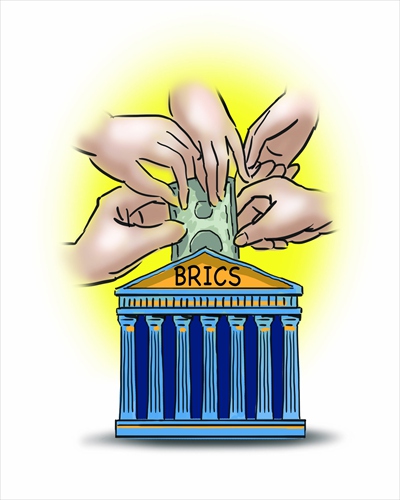 |
| (Illustration: Liu Rui/GT) |
The sixth BRICS summit concluded in Brazil's northeastern city of Fortaleza on July 16, and leaders of the five BRICS countries announced the establishment of the new development bank and a currency reserve pool, arousing wide attention and various opinions from the international community. This truly represented a groundbreaking achievement in the history of the BRICS.
Though US economist Jim O'Neill coined the term "BRIC" as early as 2001, the BRIC group, which included South Africa in 2011 to become BRICS, has never been viewed in the West as a positive and effective platform since the first day it was established in 2009.
Some Western media outlets commented that the BRICS countries had nothing in common but a shared ambition. However, with BRICS ushering in its sixth year, the launch of the $100 billion bank and the contingency fund has successfully refuted this view, and demonstrated the vitality of the new emerging markets.
The setting up of the actual institutions makes the cooperation among the BRICS countries more substantial. During the past years, the grouping just held regular meetings for government heads, business people, financiers and those working for think tanks.
Plus, the bank and the fund are conducive to the development of the five member states by offering a fire wall for exchange rate fluctuations in the global market. In this way, they may help in economic growth and financial stability for these countries.
In parallel, the financial progress struck at this year's summit is of great significance to the health and stability of the international financial system, which has been dominated by the Bretton Woods system since 1944.
This West-dominated system helped lift countries plunged into economic wreckage by WWII, contributing to global prosperity in the postwar era.
But on the other hand, the Bretton Woods system, whose planners established the World Bank and the IMF, is after all a pro-Western financial order for monetary and exchange rate management.
And during its development, it has become highly politicized, US-centric, as well as bureaucratic, all of which has been denounced by not only the developing world but also major industrial states.
From this perspective, the BRICS development bank poses an objective challenge to the World Bank. However, this is believed to be a healthy competition and will drive the Bretton Woods system to be fairer.
The bank's headquarters being placed in Shanghai has been criticized by the West.
The Financial Times said the new bank hovers under China's shadow, and the Reuters called China a "big brother."
Nevertheless, it is a normal and rational decision to base the bank in Shanghai. China boasts the largest economic aggregate among all the five BRICS members, and Shanghai is a rapidly growing financial center.
It is true that China's GDP last year amounted to approximately $9.3 trillion, more than the total GDP of all the other members combined.
Apart from such economic imbalance, Beijing and New Delhi are mired in simmering border disputes. And Moscow has been pursuing a different strategic direction through the BRICS platform.
Facing increasingly stringent pressure from the US-led West, Moscow is attempting to turn BRICS into a tool to rival and hedge Washington. But China is determined to emphasize this grouping is not a political alliance.
Despite the Western world's negative views and the differences among the five nations, they have much in common.
Long positioned at the margins by the West, they have been aspiring for a change in the status quo.
Furthermore, these countries have developed relatively pragmatic and mature foreign policies and are expected to seek more collaboration.
The nature of the BRICS as a forum does not allow it to be dominated by a certain country, and as a result all countries should gain fixed profits on an equal footing.
 Zhujiang ambassadors attend lotus lanterns activity
Zhujiang ambassadors attend lotus lanterns activity
 From girly girl to tough special police officer
From girly girl to tough special police officer
 Children attend gymnastics training in summer
Children attend gymnastics training in summer
 Beautiful sceneries along the special travel route in Xinjiang
Beautiful sceneries along the special travel route in Xinjiang
 Focus on 1st female patrol team in Turpan
Focus on 1st female patrol team in Turpan
 Collection of 'China Dream' public-spirited ads
Collection of 'China Dream' public-spirited ads  National fitness team members integrate traditional and modern beauty
National fitness team members integrate traditional and modern beauty Moms on their kid’s coming out
Moms on their kid’s coming out Chinese fighters through lens
Chinese fighters through lens
 48 hours after super Typhoon Rammasun
48 hours after super Typhoon Rammasun Bikini show held at water park in Xi'an
Bikini show held at water park in Xi'an
 Lobster vs cat: catch me if you can
Lobster vs cat: catch me if you can  Heat waves sweep China
Heat waves sweep China  Top 10 most beautiful islands in China
Top 10 most beautiful islands in China
 Zhou Xun announces engagement to Archie Gao
Zhou Xun announces engagement to Archie Gao
Day|Week|Month